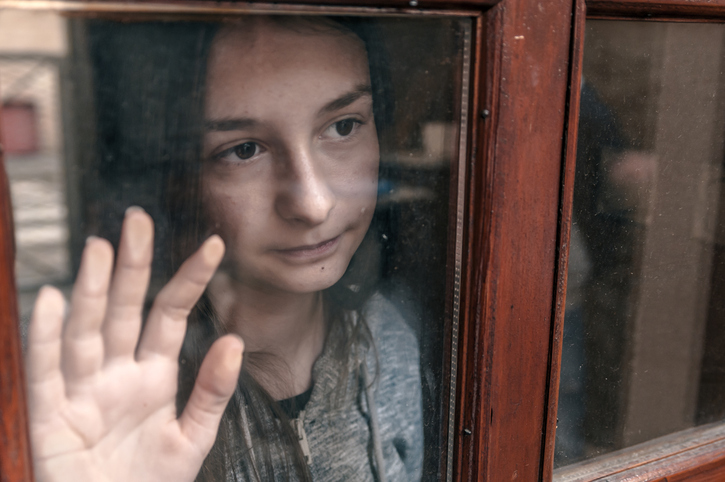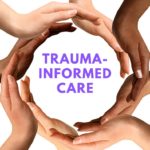
Read Part 1: The Kids Are Not Alright: How Trauma Affects Development
People can heal from trauma, even trauma as extreme as childhood sexual abuse. The detrimental outcomes for those who suffered childhood sexual abuse, or other significant trauma, is because many of those individuals did not get any help to address the experience. Without appropriate interventions, the impact to an individual compromised by trauma is significant and impacts most parts of their lives.
Research in the arena of Adverse Childhood Experiences (ACE’s) and developmental trauma has flourished in the last decade and there are proven strategies, like trauma-informed care which can mitigate the damage of past abusive and adverse experiences.
We Must Ask About Sexual Abuse
 Research shows that most children do not disclose sexual abuse immediately after the abuse occurs. In fact, many children do not disclose the abuse for years, if they disclose at all. Many adult survivors of child sexual abuse have never told anyone about their experience. This reality requires we help people who are not asking for help. The shame and guilt many victims experience make it difficult for them to ask for help.
Research shows that most children do not disclose sexual abuse immediately after the abuse occurs. In fact, many children do not disclose the abuse for years, if they disclose at all. Many adult survivors of child sexual abuse have never told anyone about their experience. This reality requires we help people who are not asking for help. The shame and guilt many victims experience make it difficult for them to ask for help.
Many young victims are manipulated and brainwashed by their abusers and they are convinced that if they told about their abuse nobody would believe them. Fearing further isolation or retaliation by their abuser, they choose to suffer silently. For many victims of childhood sexual abuse, the pain they feel keeping their abuse to themselves is preferable to their fear of what might happen if they tell.
When education or healthcare professionals include questions about abuse histories in their intake, it begins to destigmatize the experience of abuse for victims. Though asking questions about abuse is unlikely going to prompt an immediate disclosure, just hearing the question as part of an assessment makes them realize they are not the only person with this experience. According to some survivors, the mere presence of the question about abuse on the intake makes them realize they are not alone and the idea that it might be safe to tell is planted.
Talk Early, Open, and Often
 It is critical that parents, teachers, and healthcare providers have conversations about childhood sexual abuse early and often. Trauma-informed adults and parents should have a plan on how they would respond if faced with a disclosure. Many adult survivors of childhood sexual abuse described the secondary trauma they faced when they discussed their abuse, or the truth was discovered.
It is critical that parents, teachers, and healthcare providers have conversations about childhood sexual abuse early and often. Trauma-informed adults and parents should have a plan on how they would respond if faced with a disclosure. Many adult survivors of childhood sexual abuse described the secondary trauma they faced when they discussed their abuse, or the truth was discovered.
When adults respond with disbelief, rigorous questioning, blaming the child for not saying something sooner, or rationalizing the information in a way that discredits the child’s experience or unintentionally blames the child for the abuse, more damage is then done to the child.
Acceptance and validation of the child by a trusted adult are crucial for the psychological survival of the victim. Statistically speaking, kids rarely lie about being sexually abused. Many survivors report more anger towards those they disclosed to, and who failed to respond appropriately, than they do to the abuser. This information makes it clear that the way people respond to an initial disclosure is a critical experience for the victim. When the adult to whom they disclose responds with validation and sensitivity, the person can begin the journey of healing.
For more information on how to discuss sexual abuse with your child and how to respond to a disclosure, go to the Committee for Children’s website Early, Open, Often Start the Conversation.
Anonymous Disclosures and the Role of the Internet
Disclosures of abuse can come out in many ways and it is not uncommon for children to test the waters. Children may make a passive statement to assess if it is “safe” to tell or not. For example, a seven-year old girl who is being sexually abuse by an uncle might say to a parent “I don’t like it when Uncle comes to visit.” If the parent immediately responses with “You love your Uncle” the child gets the message that is not safe to give more information.

Without even knowing it, the parent may have missed an opportunity to save their child from a traumatic experience continuing. A trauma-informed parent may recognize that seemingly benign statement as an opportunity to get more information. Professionals say the most important message you want your child to receive is that you will believe anything they tell you and that you will love them no matter what they tell you.
It is probably not a coincidence that the #MeToo movement, using the #MeToo hashtag to highlight the frequency of sexual assault and connect survivors to the resources they need in order to heal, required the digital age to flourish. The anonymity of the internet allows people to practice disclosing sexual abuse in a safe way. The biggest fear people have about telling is being disbelieved or judged. The impact of shame and guilt they carry prevents them from getting the support they so desperately need.
When victims share their story of past abuse on the internet, victims get to have their experiences validated by other people. There are numerous websites set up by survivors that allow people to share their stories on a safe platform. The act of sharing, if only to strangers on the internet, can be very therapeutic for people.
People report gaining strength and healing from sharing their personal stories of abuse on the internet. Conversely, people who read those personal stories may identify with the writers and experience strength and healing as well. Creating a community of survivors, if even only online, can make people feel like they are no longer suffering alone: this experience can be very empowering for people.
Trauma-Sensitive Settings in the Real World
 For community settings to be trauma-sensitive, they need to work towards the goal of ensuring their participants feel safe and comfortable. Creating an environment and a culture of trust is the first critical step to engage those with past trauma.Training on trauma should be standard for all professionals within an organization and should be the new standard of care. Making sure that clients have a sense of control over what happens to them is important.
For community settings to be trauma-sensitive, they need to work towards the goal of ensuring their participants feel safe and comfortable. Creating an environment and a culture of trust is the first critical step to engage those with past trauma.Training on trauma should be standard for all professionals within an organization and should be the new standard of care. Making sure that clients have a sense of control over what happens to them is important.
Settings with children find that having “safe” spaces in the room, which allow individuals to regroup and settle down when emotional or agitated, is very important. Emotional dysregulation and impaired coping skills are common in children who have high ACE’s. Allowing children the opportunity to learn self-soothing skills and self-mastery improve future outcomes.
Acknowledging the high ACE’s of their students, some schools within inner cities, changed their entire curriculum to incorporate trauma-informed values: safety, choice, collaboration, trustworthiness and empowerment. According to one study, when schools are trauma-informed, students cultivate lasting resilience, and the schools have seen significant improvements in behavior, fewer suspensions, fewer expulsions and, significant improvements in academic achievement
Learning Mastery Over Your Mind and Body
 A 2014 study suggests that mindfulness meditation can help ease psychological stressors such as anxiety, depression, and pain. The ability for those exposed to trauma to learn to regulate their stress response is very valuable. Learning to emotionally self-regulate and feel control over your own body can be very empowering for those who have endured abuse. The use of yoga and meditation for trauma healing is so common now that many studies offer classes dedicated to trauma release and stress management.
A 2014 study suggests that mindfulness meditation can help ease psychological stressors such as anxiety, depression, and pain. The ability for those exposed to trauma to learn to regulate their stress response is very valuable. Learning to emotionally self-regulate and feel control over your own body can be very empowering for those who have endured abuse. The use of yoga and meditation for trauma healing is so common now that many studies offer classes dedicated to trauma release and stress management.
Success of this type of intervention has been demonstrated in the military, prisons, and schools. Practitioners in these settings, understanding the nature of trauma in their clients, set the environment to help clients feel safe; offering single gender classes, not aligning or touching a participant without their consent, and accepting any emotions that may be expressed during the session.
Wide-spread implementation of trauma-informed care initiatives or meditation programs can help all individuals, even those who are reluctant to discuss their trauma or abuse.
This benefit cannot be underestimated because those who have suffered serious abuse, specifically sexual abuse, do not always disclose abuse or seek treatment. These systematic changes can mitigate the damages of ACE’s without requiring anything from the victim but participation.
Why Do People with Trauma Histories Have Such Poor Health?
I think most people can understand why people with significant abuse histories have psychological problems, even substance abuse issues. But, why physical issues? One reason is that living with chronic stress causes numerous health issues over time.
 Another reason is that medical exams can feel invasive and illicit feelings of vulnerability, so sexual abuse survivors might avoid needed medical care. Medical staff often ask sensitive questions, examining intimate body parts, and treatments can be painful. It is important that healthcare providers are mindful of the fact that so many people have a history of trauma. For a person to transition from a victim to a survivor, they must experience a sense of control over their bodies.
Another reason is that medical exams can feel invasive and illicit feelings of vulnerability, so sexual abuse survivors might avoid needed medical care. Medical staff often ask sensitive questions, examining intimate body parts, and treatments can be painful. It is important that healthcare providers are mindful of the fact that so many people have a history of trauma. For a person to transition from a victim to a survivor, they must experience a sense of control over their bodies.
Having patients in the role of a collaborator in their healthcare experience, the doctor not acting as the authority, keeping them informed of procedures, listening to their feedback, allowing them to decide who is in the room with them during exams and procedures, all can help increase the likelihood that people will access the healthcare they need.
Again, we know people probably will not disclose abuse histories so medical practitioners need to act as if all patients have a trauma history. By operating from a full trauma-informed model, practitioners can create a therapeutic experience even if the patient doesn’t disclose their abuse history. By asking passive questions like, “Is there anything in your history that makes seeing a practitioner or having a physical examination difficult?” or, “Is there anything I can do to make your visit and exam easier?”, patients feel safe and empowered.
The Path to Healing
 When people feel safe and empowered, the possibility of healing begins. Research has shown that therapy can improve the outcomes for those living with the residual effects of trauma exposure. There are therapists and types of therapeutic models that specialize in trauma; Trauma Focused-Cognitive Behavioral Therapy (TF-CBT) and Dialectical-Behavior Therapy to name a few. Mental health professionals recommend individual, group, or family therapy to help those exposed to adverse or abusive events.
When people feel safe and empowered, the possibility of healing begins. Research has shown that therapy can improve the outcomes for those living with the residual effects of trauma exposure. There are therapists and types of therapeutic models that specialize in trauma; Trauma Focused-Cognitive Behavioral Therapy (TF-CBT) and Dialectical-Behavior Therapy to name a few. Mental health professionals recommend individual, group, or family therapy to help those exposed to adverse or abusive events.
Research indicates that with the right therapeutic intervention, the long-term effects of child abuse can be minimized. Children are naturally resilient, and just a little effort to build on that resilience can go a long way to change the outcome for children and adults living with trauma.
“I can be changed by what happens to me. But I refuse to be reduced by it.”
― Maya Angelou
Read Part 1: The Kids Are Not Alright: How Trauma Affects Development






Join the Conversation